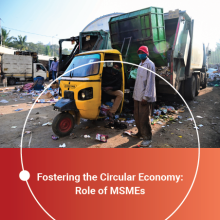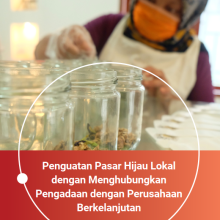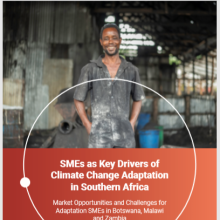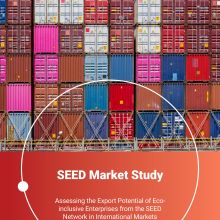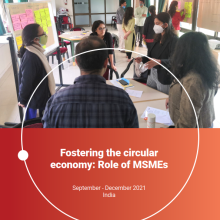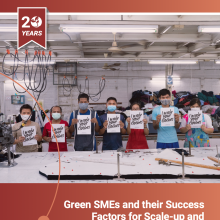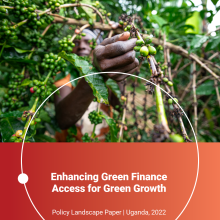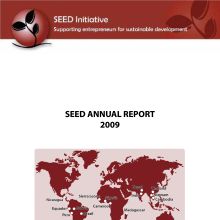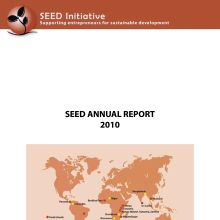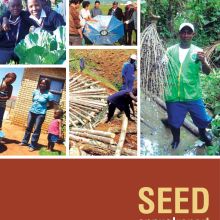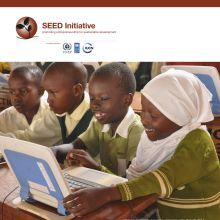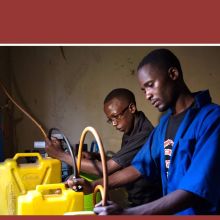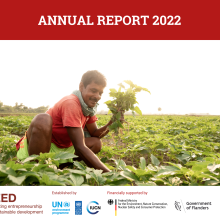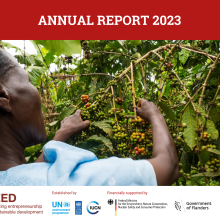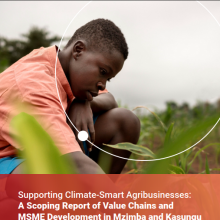- In this primary edition of a series of reports, we illuminate the black box of eco-inclusive entrepreneurship by providing readers with a first-of-its-kind comprehensive typology on eco-inclusive SMEs.
- This scoping paper provides the basis for the implementation of the collaborative, multi-step process of the SEED Hack for Climate Finance in Thailand in 2021. Thailand’s high environmental richness and fastly evolving landscape of small- and medium-sized enterprises (SMEs) present a significant opportunity for the country to meet its climate action and development objectives. In particular, climate-smart SMEs- offering products and services for climate change adaptation and/or mitigation- are well-positioned to absorb and scale the environmental, social, and economic impacts of global climate finance flows in line with Thailand’s climate action objectives.
- The Circular Economy (CE) policy context as it relates to micro, small and medium enterprises (MSMEs) in India is essential to integrating and mainstreaming the transition to the circular economy in India.
- The Indonesian government has placed a strong emphasis on the development of local economies across the country, and have put into place important steps to align government spending on procurement with this priority. Linking eco-inclusive MSMEs to public procurement opportunities can leverage the potential for MSMEs to drive local sustainable economic development through their growth.
- Pemerintah Indonesia telah memberikan penekanan yang kuat pada pengembangan ekonomi lokal di seluruh negeri, dan telah menempatkan langkah-langkah penting untuk menyelaraskan pengeluaran pemerintah untuk pengadaan dengan prioritas ini. Bersamaan dengan kampanye #BanggaBuatanIndonesia untuk mendorong minat dan permintaan barang dan jasa produksi dalam negeri, Peraturan Presiden Nomor 12 Tahun 2021 tentang Pengadaan Barang dan Jasa Pemerintah (“Peraturan 12/2021”) mewajibkan Kementerian, Lembaga, dan Pemerintah Daerah untuk menggunakan setidaknya 40% anggarannya untuk mendapatkan produk dalam negeri dari usaha mikro dan koperasi. Prioritas untuk mendukung usaha mikro, kecil dan menengah (UMKM) untuk mengakses pasar melalui belanja pemerintah berpotensi mendorong upaya pemulihan ekonomi di tingkat lokal dan nasional.
- The report expands the still-nascent body of case study-based literature on adaptation entrepreneurship, and is thus suited for academia and practitioners active in this field. It is the first one to identify opportunities for successful adaptation entrepreneurship as well as barriers to growth and scale in the region.
- Manifested through the SDGs and the Paris Climate Agreement, the international community has agreed to tackle prevalent economic, environmental, and social challenges, whereby the private sector and businesses can make a pivotal contribution. This report analyses the international market potential of end-consumer products offered by enterprises from the SEED network from a supply and demand perspective, as well as identifying possible avenues for support.
- This policy brief looks at the role of MSMEs in catalysing the circular economy in India, and puts forward some recommendations and policy solution prototypes to support and unlock circular economy entrepreneurship. The recommendations and prototypes were developed as part of the SEED Practitioner Labs for Policy Prototyping in India, 2021.
- The purpose of this Driving Green Recovery Pathways in South and Southeast Asia: Insights from Micro, Small, and Medium-Sized Enterprises and Intermediaries report is to showcase the importance of green and social MSMEs to drive Green Recovery and identify the supports that the intermediary and policy could provide. The insights in this report are derived from The Green Recovery Forum: Leveraging the contributions of MSMEs to achieve the Sustainable Development Goals.
- This report analyses small and medium-sized enterprises (hereby SMEs) with green business models and explores how selected enterprises scale and replicate their activities. Its main objective is to provide insights into the critical success factors for scaling and replication. It is intended for policymakers and intermediaries to draw direct insights from SMEs. It analyses the critical success factors for scale-up and replication of enterprise activities and highlights concrete recommendations to close existing gaps in order to maximise their contribution to the SDGs. Green SMEs can find inspiration through the case studies in the annex of this report. This report was prepared in collaboration with GO4SDGs.
- This policy landscape paper provides an overview of the state of green finance in Uganda, an overview of the relevant legal and regulatory frameworks, and highlights the challenges to accessing (by MSMEs) and delivering (by banks and finance institutions) green finance in Uganda.
- This policy brief highlights three prototypes developed as solutions to accelerate green finance flows in Uganda, and serve as inputs to the new Uganda Green Finance Strategy developed by the National Planning Authority.
SEED 2009 Annual Report sets out our main activities and achievements for the period from May 2006 - December 2008.
The SEED Annual Report 2010 covers SEED’s progress and developments in 2010, as well as information on the SEED Award Winners and SEED Gold Winners from 2009: how SEED helps its winners to establish scale up; and tools developed by SEED for social and environmental entrepreneurs.
2011 was a remarkable year for SEED, where a record number of SEED winners were awarded.
In 2012, SEED has not only continued to work with a record number of inspiring and innovative grassroots social and environmental enterprises all over the world, but has also formed new partnerships and participated in major events which contributed to the promotion of both gender equality and the green economy.
Looking back, 2013 has been a particularly good year for SEED, a year marked particularly by the selection of the 34 new SEED Winners - remarkable exemplars of social and environmental entrepreneurs at the grassrootsand by growing interest internationally in the programme, but also by new partnerships to build on those that have been essential in SEED’s growth so far.
2014 was truly exceptional; a year where SEED recognised over forty new SEED Winners - remarkable enterprises that generate grassroots eco-solutions at the grassroots. This and more great SEED achievements in our annual report.
2015 was also a special year for SEED, in which the partnership celebrated 10 Years of SEED Awards, and took the opportunity to take stock and publish a comprehensive Flagship Report that looked not only on the success of former SEED Winners and the lessons learnt over those 10 Years of SEED Awards, but also on opportunities that could help increase the impact of locally-driven social and environmental entrepreneurship in the years to come. This and more you will find in the Anual Report
This Annual Report guides you through the innovative ways that SEED has advanced in 2016 to serve as an active thought leader in the realm of eco-inclusive entrepreneurship for sustainable development, while also introducing to you this year’s SEED Winners that are all individually driving sustainable development forward in their communities and in their countries.
Our annual visual report (A Year at SEED | 2018) celebrates achievements across both our Direct Enterprise Support and Ecosystem Building programmes plus shares our involvement in key high-level dialogues and milestones in organisational development, while introducing you to this year's SEED Low Carbon Award Winners who offer innovative solutions for climate change adaptation and mitigation.
2022 is a special year for SEED, not only celebrating 20 years but also drawing lessons from activities and various projects, initiating new collaborations while looking forward to 2023 and beyond, being better informed and equipped to contribute to urgent transformative change with and through SMEs. The 2022 Annual Report highlights SEED activities and achievements in terms of enterprise support, ecosystem building and advocacy.
In 2023, SEED has been hard at work supporting SMEs and promoting their crucial role in advancing sustainable and eco-friendly future, as well as fostering the transition to a circular economy. We are delighted to share some of our most meaningful achievements and activities, as we reflect on the passing year.
This scoping study examines agricultural value chains and the MSME landscape in Malawi’s Mzimba and Kasungu districts, drawing on in-depth interviews with local entrepreneurs, cooperatives, youth organizations, and business service providers.



